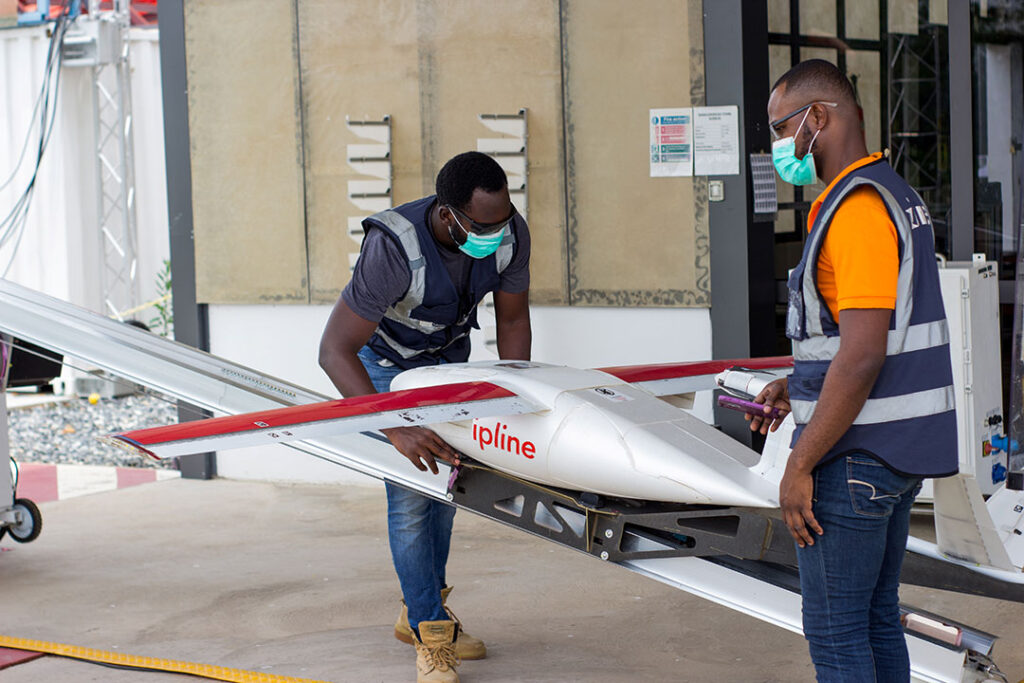ADF STAFF
Health workers are taking to the sky in the battle against COVID-19, using drones to deliver medicines to remote areas, spread public health messages and disinfect public spaces. Drones have also inspired thousands of young people to explore new ways to use the technology.
“We’ve seen that drones have a niche in many different contexts. There’s really a lot of innovations to be seen in Africa,” Edward Anderson, a Tanzania-based World Bank digital specialist told a World Economic Forum gathering in Cape Town, South Africa.
While drones have played a role in everything from agriculture to mapping to mosquito control, COVID-19 has pushed African nations to embrace the technology as a way to leapfrog over hurdles, such as poor road networks, as they respond to the demands of the pandemic.
Rwanda
In February, Rwanda hosted the Africa Drone Forum to explore the ways the continent can use the technology better. The nation has set itself up as a testing ground for drone technology, giving rise to numerous startups.
Rwanda set the stage for the shift toward widespread drone use when the government signed on with Zipline, which uses autonomous, GPS-guided fixed-wing drones to deliver blood supplies, vaccines and other health care needs to remote areas.
The same trip that once took three hours by road now takes 15 to 25 minutes by drone. That means Rwanda’s health system can respond more quickly to emergency cases in rural areas while wasting fewer resources, including donated blood, according to Paula Ingabire, minister of Information, Communications and Technology, and Innovation.
“Using drones was slightly more expensive than using a car, but the savings on blood wastage and the amount of time it takes to get it there compensated for that,” Ingabire told the World Economic Forum.
Ghana
The arrival of COVID-19 in West Africa gave Ghanaian drone pilot Eric Acquah a new purpose for his 3-year-old company, AcquahMeyer Drone Tech. He quickly shifted his operations from spraying agricultural pesticides to spraying disinfectant in public areas.
Under a contract with local authorities, Acquah used 20 drones to disinfect 38 markets, which play a key role in Ghana’s economy and the daily lives of residents. What might have taken days and dozens of people on the ground took a matter of minutes from the air.
“We targeted the market areas because in Africa they are open-air and always overpopulated,” Acquah told Reuters. “So, we thought if the virus is going to spread fast, it will be from them.”
Operators provided similar services in Morocco, Nigeria and Botswana, repurposing drones from agricultural work to spraying disinfectant in streets and public spaces to fight the spread of COVID-19.
South Africa
Early in the pandemic, residents of rural Limpopo province’s Greater Tzaneen Municipality heard their mayor’s voice coming from the sky, warning them to keep their distance to prevent the spread of the coronavirus.
Taking the message to the air allowed the mayor to cover a lot of territory in the rural community with minimal effort, according to Sam Twala, chair of the South African Federation of Unmanned Aircraft Systems.
“And when it comes to things like your cost, that’s actually where drones add much more value, because drones offer that advantage where you can tactically place your people,” Twala told Voice of America.
Since then drones have carried messages — both spoken and visual — to communities across the continent, hovering over busy streets and marketplaces to drive home important health messages.
Malawi
The rapid growth of drones across Africa prompted the development of Malawi’s African Drone and Data Academy to train the next generation of drone builders and pilots. Supported by UNICEF and U.S.-based university Virginia Tech, the academy’s first graduating class in April included 50 members from across the continent.
Working with UNICEF, Malawi created a special corridor outside the capital for testing ways to use drones for humanitarian purposes, such as mapping disasters, serving as aerial Wi-Fi towers, and delivering vaccines.
Other drone schools have opened in Zimbabwe, Senegal, and elsewhere to spread the knowledge and support new uses for drone technology.
In May, the Malawian drone academy launched a partnership with drone maker Wingcopter to deliver health care supplies during COVID-19.

